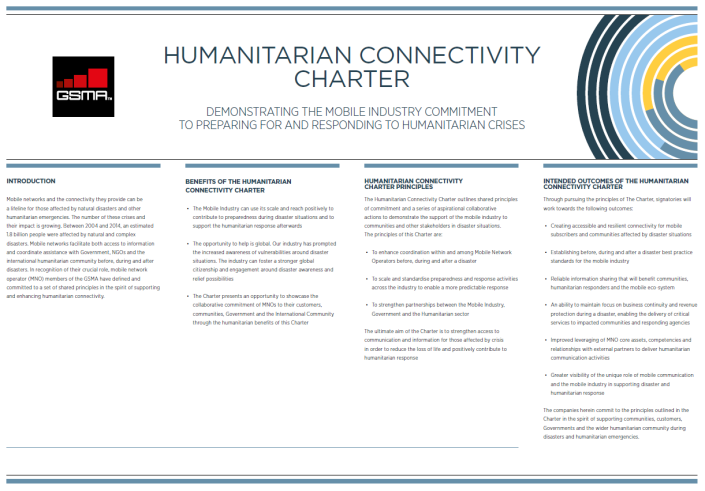Connectivity
10. Humanitarian Connectivity Charter: Mobile Industry Commitment to Supporting Affected Populations
Panelists: Ms. Kyla Reid, Head, Disaster Response, GSMA; Ms. Alexandra Sicotte-Levesque, Communicating with Communities Coordinator, UN OCHA; Mr. Karim Khoja, CEO, Roshan Telecom; Mr. Ramon Isberto, Head, Public Affairs, PLDT and Smart Communications; Mr. Abdulla Hassan, Public Relations & Communications Senior Manager, Asiacell
Wednesday, 29 April, 14:20-15:00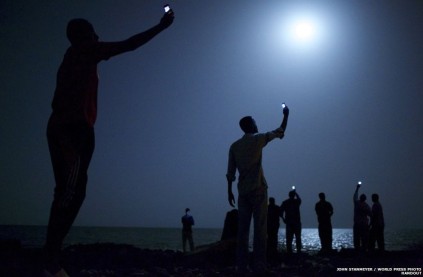
This panel discussion led by Kyla Reid and Alexandra Sicotte-Levesque “Humanitarian Connectivity Charter: Mobile Industry commitment to supporting affected populations” provided an introduction to the objectives of The Humanitarian Connectivity Charter and outlined its potential impact for humanitarian operations in the field and for improving access to communications for those affected by crises.
Panelists reflected on successful initiatives of Mobile Network Operators (MNOs) in providing services to people affected by crises, as well on what challenges and obstacles need to be addressed to ensure that the charter can be fully implemented.
Ms. Kyla Reid, Head, Disaster Response, GSMA
As Head of the Disaster Response Programme, Kyla is responsible for leading the mobile industry in improving resilience and engaging in coordination initiatives that most effectively support citizens and humanitarian organisations on the ground following a crisis.
Prior to joining the GSMA, Kyla worked with a range of organisations focused on humanitarian response, failed and fragile state policy and development.
Kyla holds an Msc in International Development from the London School of Economics.
Ms. Alexandra Sicotte-Levesque, Communicating with Communities Coordinator, UN OCHA
 Alexandra Sicotte-Levesque is UNOCHA’s Global Coordinator for Communications with Communities since July 2014. Alexandra came to OCHA from the UN Population Fund (UNFPA) where she worked on humanitarian communications and deployed to the Philippines (Typhoon Haiyan) and Jordan (Syria crisis). Alexandra also worked in Sudan for more than three years in the field of media and development, first as Country Director for BBC Media Action and later as Radio Producer for the UN peacekeeping mission. In 2002, she co-founded the non-profit organization Journalists for Human Rights (JHR). Throughout her humanitarian career, Alexandra has also been a documentary filmmaker and has produced two feature films.
Alexandra Sicotte-Levesque is UNOCHA’s Global Coordinator for Communications with Communities since July 2014. Alexandra came to OCHA from the UN Population Fund (UNFPA) where she worked on humanitarian communications and deployed to the Philippines (Typhoon Haiyan) and Jordan (Syria crisis). Alexandra also worked in Sudan for more than three years in the field of media and development, first as Country Director for BBC Media Action and later as Radio Producer for the UN peacekeeping mission. In 2002, she co-founded the non-profit organization Journalists for Human Rights (JHR). Throughout her humanitarian career, Alexandra has also been a documentary filmmaker and has produced two feature films.
Originally from Montreal, Canada, Alexandra received her MSc in Human Rights from the London School of Economics.
Mr. Karim Khoja, CEO, Roshan Telecom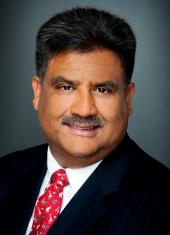
Karim Khoja, Chief Executive Officer of Roshan, has over 25 years of experience in the telecommunications industry, including starting and managing extremely successful GSM companies in Pakistan, Poland, Croatia, Tajikistan and Afghanistan. Under his leadership, Roshan has grown to be Afghanistan’s market leader, with more than six and a half million customers. Mr. Khoja started his GSM career as CEO for Mobilink in Pakistan, and then launched Era GSM in Poland. He then went on to spin out the mobile company, T Mobile, from the incumbent Croatia Telecom.
Over the course of the last eleven years, Mr. Khoja has dedicated his time to the Aga Khan Fund for Economic Development (AKFED) to bring competition and best practices to the telecommunication industry in Afghanistan and Tajikistan. He has focused not only on financial results, but also on how technology can be used to change lives.
Mr. Khoja serves on the board of IPS West Africa and T Cell in Tajikistan. He is the Chairman of the Afghan Investment Climate facility (Harakat), a £30m fund to encourage private enterprise, an advisor to the GSMA Development Fund and until a year ago a Associate Board Member of the Legatum Center at MIT.
Mr. Ramon Isberto, Head, Public Affairs, PLDT and Smart Communications
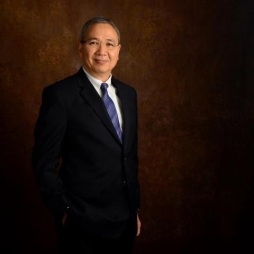 Mr. Isberto is the concurrent Public Affairs head of the Philippines’ biggest telecommunications firm, the Philippine Long Distance Telephone Company (PLDT), and its wholly-owned wireless subsidiary, Smart Communications Inc.
Mr. Isberto is the concurrent Public Affairs head of the Philippines’ biggest telecommunications firm, the Philippine Long Distance Telephone Company (PLDT), and its wholly-owned wireless subsidiary, Smart Communications Inc.
His media experience spans over 30 years of work in newspapers, wire service, television and public relations. He was a special sections editor of a leading Philippine business daily and Manila bureau chief of an international wire service covering not only domestic events, but also regional and international development issues. He was executive producer of a leading public affairs program and a talk show host of a business and general affairs morning program. He also served as the vice president for public affairs of a major broadcast network.
Outside of the PLDT Group, Mr. Isberto is the president of the Corporate Network for Disaster Response (CNDR), a fellow of the Social Weather Stations, an independent opinion poll organization, a member of the National Press Club, the Philippine Futuristic Society, and the Economic Journalists Association of the Philippines. In 2012, Mr. Isberto was conferred with the prestigious Accredited in Public Relations (APR) distinction from the Public Relations Society of the Philippines (PRSP) for displaying excellence and integrity in the practice of the profession.
Mr. Abdulla Hassan, Public Relations & Communications Senior Manager, Asiacell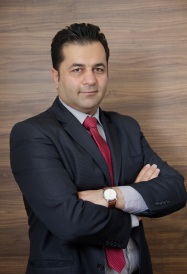
Abdulla Hassan is the Public Relations and Marketing Communications Senior Manager of Asiacell, the first Iraqi telecom company. Hassan assumed this position in 2009 to lead a capable team of 32 Public Relations and Marketing Communications professionals. Hassan has scored numerous achievements as the company’s PR & MarCom manager, most notably of which is increasing the company’s brand image and corporate reputation in a record time of 3 years. As the company’s PR & Communications head, Hassan shoulders the responsibilities of devising and implementing Asiacell’s PR long-term strategies, monitoring the work process and controlling quality of Corporate Social Responsibility (CSR), sponsorship programs, media relations strategies, creativity and managing marketing communications.
Since joining Asiacell in 2005, Hassan has assumed a number of critical positions at the company. He was appointed as the official spokesperson for Asiacell, for which he was greatly qualified due to his staggering ability to communicate with the various media and social segments in the country.
Hassan acquired B.A. in English Language and Literature from Sulaimanya University in 2000. He also acquired a Master’s degree in Business Administration, International Management and Leadership 2011 at the American University in Iraq.
Links to related material:
GSMA Disaster Response
UN Office for the Coordination of Humanitarian Affairs
GSMA Humanitarian Connectivity Charter
Roshan Telecom
Smart Communications
Asiacell
15. From Typhoon Haiyan to Typhoon Hagupit: Reflections on a Year of Building Data Preparedness and Resilience Networks in the Philippines
Presenters: Mr. Andrew Schroeder, Director of Research and Analysis, Direct Relief; Mr. Justin Richmond, Mission Specialist, Palantir Technologies
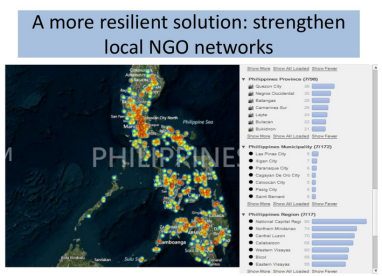 Thursday, 30 April 2015, 11:50-12:20
Thursday, 30 April 2015, 11:50-12:20
The session presented findings from collaborative data preparedness and community resilience work between the milestones of Typhoons Haiyan and Hagupit in the Philippines.
During Typhoon Haiyan, Direct Relief and Palantir partnered on the MIMOSA (MIniature MObile SAtellite) project for real-time collection of needs assessment data via satellite-connected SMS. Data from the community and infrastructure assessments was integrated via the Palantir Gotham software with open data on international response actors via OCHA and the NDRRMC to gain dynamic understanding of where the response was concentrated relative to storm impacts.
In part on the basis of post-Haiyan findings from the MIMOSA data, which indicated significant gaps between the international response and the needs of many communities, Direct Relief teamed up again with Palantir throughout 2014 to expand data-driven resilience activities with local partners, particularly the Filipino voluntary organization Gawad Kalinga. The goals of this activity have been:
- Staging data collection and analysis tools with regional leads through the country,
- Improving network-independent data collection through integration with ODK (Open Data Kits)
- Establishment of viable community and health assessment ontologies
- Creation of data sharing arrangements prior to the onset of new events
As a result of these activities Gawad Kalinga is beginning to collect baseline data from as many as 20,000 barangays and to create new community-level data collection and analysis practices. These new arrangements have already been put to the test during response to Typhoon Hagupit in December 2014, producing a wealth of insight into how we might best help to improve disaster response through flexible, technologically-enabled, locally-driven and internationally supported efforts.
Mr. Andrew Schroeder, Director of Research and Analysis, Direct Relief
 Andrew Schroeder is the Director of Research and Analysis at Direct Relief. He specializes in geographic information systems (GIS) for humanitarian operations and global public health. Andrew and Direct Relief were recognized in 2013 for this work with the President’s award from Esri, and again in 2015 with Esri’s special achievement in GIS award. Andrew is currently engaged in a wide range projects, from the evaluation of global drug donation programs to the use of unmanned aerial vehicles for disaster response to the deployment of GIS tools to track and count community health workers to the implementation of spatial analysis in the national laboratory systems of Ethiopia and Indonesia. He has worked on analytics for disaster relief in crises ranging from Typhoon Haiyan in the Philippines to Hurricane Sandy in New York and the Haiti earthquake. In 2014 he founded the Nethope working group in humanitarian UAVs and joined the advisory board of UAViators. He also serves on the global advisory board to the One-Million Community Health Workers Campaign. Andrew received his PhD from New York University’s Department of Social and Cultural Analysis and his Masters in Public Policy from the Ford School at the University of Michigan.
Andrew Schroeder is the Director of Research and Analysis at Direct Relief. He specializes in geographic information systems (GIS) for humanitarian operations and global public health. Andrew and Direct Relief were recognized in 2013 for this work with the President’s award from Esri, and again in 2015 with Esri’s special achievement in GIS award. Andrew is currently engaged in a wide range projects, from the evaluation of global drug donation programs to the use of unmanned aerial vehicles for disaster response to the deployment of GIS tools to track and count community health workers to the implementation of spatial analysis in the national laboratory systems of Ethiopia and Indonesia. He has worked on analytics for disaster relief in crises ranging from Typhoon Haiyan in the Philippines to Hurricane Sandy in New York and the Haiti earthquake. In 2014 he founded the Nethope working group in humanitarian UAVs and joined the advisory board of UAViators. He also serves on the global advisory board to the One-Million Community Health Workers Campaign. Andrew received his PhD from New York University’s Department of Social and Cultural Analysis and his Masters in Public Policy from the Ford School at the University of Michigan.
Mr. Justin Richmond, Mission Specialist, Palantir Technologies
Justin Richmond is currently a forward deployed engineer at Palantir Technologies as well as a Truman National Security Project Fellow. At Palantir, he led the field implementation for the Typhoon Haiyan and Typhoon Hagupit responses in the Philippines. Justin is currently working on data-driven countering violent extremism (CVE) programming in Iraq. He has appeared on BBC World News Service, CCTV’s Cultural Hour, and Radio Sawa speaking on East Asian security issues, North Korea, and nuclear nonproliferation.
Before joining Palantir, Justin deployed to Afghanistan to serve as USAID’s District Stability Framework coordinator to civilian District Support Teams and tactical military units. In that role, he advised and mentored joint civilian/military/Afghan teams on stabilization implementation, and monitoring and evaluation in eastern Afghanistan’s most contested districts.
Justin has worked extensively with local populations in northeastern China, South Korea, and throughout the Philippines. Justin also served in the U.S. Army, first as an Airborne Infantryman and then as a special operations team leader in the southern Philippines in 2009, where he focused on stabilization, counterinsurgency, and information operations. He received his B.A. in Public Policy studies from Duke University in 2005 and is a fluent Korean speaker.
Links to related material:
Direct Relief
Mimosa Project
Palantir Technologies
Palantir Disaster Preparedness
